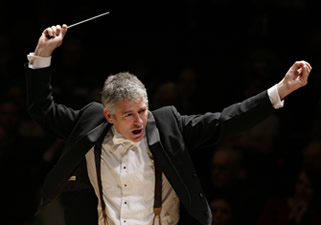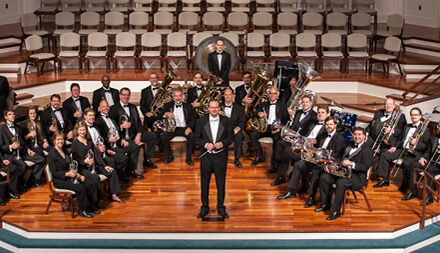The Durham Symphony, under the baton of William Henry Curry, beginning his third year of this pleasant association, presented a concert titled “War and Peace” at the historic Carolina Theatre in downtown Durham. The concert was a benefit performance for Housing for New Hope, a nonprofit organization serving the needs of homeless individuals and those at risk of homelessness in Durham and Orange Counties. Declaring the concert title, Curry began the program with Mendelssohn’s stirring “War March of the Priests” from Athiala. The orchestra was in top form and played the march sections with crisp precision and the quieter middle section with warmth and sumptuous beauty as Mendelssohn’s music pictured the priests of Athiala preparing for war.
Second on the program was Beethoven’s “Military March in C Major” (“Zapfenstreich”) for woodwinds, brass and percussion. It is based on a bugle call that beckons soldiers home. The rhythmic strains of the march were captivating and infectious. I observed a delightful six-year-old girl sitting a few rows in front of me waving her arms like the conductor, in perfect rhythm to the music. As firmly as her mother tried, she could not restrain the little girl. Well, music does that to all of us at times. It possesses us and moves us so deeply that we cannot curb the emotions and sometimes the actions it connects within us.
As a representation of the peace aspect of the program title, Curry called upon music by the Armenian-American composer Alan Hovhaness. His Second Symphony, subtitled “Mysterious Mountain,” plays on the common symbolism of the mountain as the archetype of human yearning for the highest and finding peace there. Cast in three movements, the piece is typical of Hovhaness’ rather mystical and spiritually-shaped music. The orchestra was clearly at home, with warm strings and uplifting brass and woodwinds. It was a very nice performance.
After intermission, the program continued with music of Heinrich Ignaz Franz von Biber, a Bohemian-born composer who flourished a couple generations before Bach and Handel. He was a widely known virtuoso violinist and wrote some strikingly effective works for that instrument, the best known of which are his “Rosary Sonatas.” The Battalia a 10 in D is a string ensemble piece descriptive of the life of a soldier. In it , Biber uses unusual string techniques, such as the violin being played with the wooden part of the bow and the bass being played with a piece of paper between the strings and the fingerboard; and there is one movement, depicting the bawdy, unruly life of the soldier, that is played in six different keys at one time. This produced a modern-sounding dissonance of striking effect. In seven short movements, some less than a minute, Biber’s Battalia gives us a creative and clever view into the life of the seventeenth-century military man. It ends with a beautiful lamentation for the wounded soldier. The strings of the symphony were impressive, and concertmaster Anne Leyland clearly relished Biber’s virtuosic solo passages.
Composer Lance Hulme has a multi-faceted career as keyboardist, conductor, arranger, educator, and critic. His music has been widely performed and has gained both critical and audience acclaim. He is currently the theory and aural skills professor at NCCU. His “Threnody for the Victims of September 11, 2001” is scored for female voices and strings. The women of the Choral Society of Durham, prepared by Rodney Wynkoop, joined the strings of the Durham Symphony for this performance. Curry introduced the work as a twentieth-century masterpiece. Text from the Book of Revelations provides familiar words of comfort clearly enunciated in unison by the women after a somber string introduction. The work grows in intensity and complexity before closing with the calming words “…and God shall wipe away all tear from their eyes.” It was a moving and soothing performance.
The concert closed with Tchaikovsky’s rousing “1812 Overture,” written to celebrate Russia’s defeat of Napoleon’s army at the battle of Borodino. A true concert warhorse, the “1812 Overture” has everything: melancholy, lyricism, heroism, and bombastic triumph. Alas, war is never really this glorious, even in victory.
It was a marvelous concert with something for everyone. The Durham Symphony and their conductor are shaping to each other with a promise of great things to come in the future.












